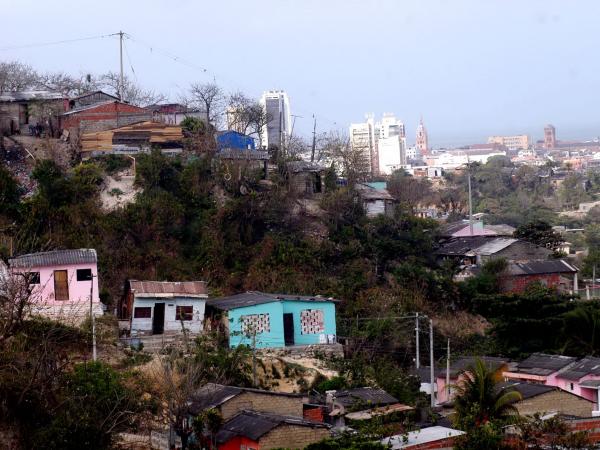
“The statements of most of its leaders is that they were not thinking of being part of the Government, which seems very good to me and it seems to me that it also gives more coherence to the Government that we are doing (…). We come from different political projects.” The words of the President-elect, Gabriel Boric, in the program ‘Tolerancia Cero’, constitute one of the examples that several members of the Christian Democrats exposed to explain an annoyance that has been germinating for some time with the future Government. As they explained, it has nothing to do with not having charges, but rather with the treatment that would be given to them, whether it is not being considered in certain spaces of definition in Parliament, due to the null signs of rapprochement after the second round and for what they accuse as a stigmatization of “the bad of the last 30 years”, unlike their partners, who seem to be the ones who did “all the good”. The annoyance is also extended to their PS partners, whom they blame for not even notifying them that the historic axis was ending.
But everything has a reason for being -they recognized- and is directly related to the state in which the party finds itself, that is, with an exit directive that has no chance of securing any type of agreement in the short and medium term , and in the midst of an “internal civil war” -as they describe the elections for the new board-, which has two conflicting theses and which are essential to know what kind of relationship is going to be established with the future administration governmental.
From the groups that also make up Approve Dignidad, a space that still has not been able to completely realign itself with the architectural change of internal power –after the entry of the center-left into the heart of the future Government–, they explained what seems obvious: “The DC has not presented willingness to be part, so they cannot be invited”.
Signs such as the non-participation of Senator Francisco Huenchumilla in an appointment with the designated future minister of the Segpres, Giorgio Jackson, or the advance payment of Deputy Miguel Ángel Calisto, regarding his position contrary to the public entity that should finance future contributions, are examples of a disenchantment that is taking root.
According to the internal phalanx, the signal that the senator for La Araucanía would have wanted to send is related to the fact that those in charge of the negotiations for the future government would have preferred to negotiate the votes with the right, before sitting down with the DC. This was explained in an interview with The counter the deputy Matías Walker. “I understand that Francisco Huenchumilla was not summoned to a meeting where the negotiation for the formation of the Senate tables was being seen, and some went to seek an agreement with the right rather than seek an agreement with the DC . These are things that annoy and, in that sense, our bench chief has only asked for respect for the DC, and that is the minimum.
In the same area, they accused that since the second presidential round was won, there had been no more signs towards the party, which for several resulted in the fact that they had not been valued enough, “considering the unconditional support they were given to get to that 55 percent. “The gestures with us are over,” added another parliamentary source consulted.
And it is that, beyond the “impossible puzzle” -as they describe it- that the President-elect is assembling, events such as the one that they did not even notify the president of the DC, Carmen Frei, that they were not going to count on them, they only deepen the feeling of being left out, they argued.
And although it is in the making, it is known within the Christian Democracy itself that the party does not have the capacity to survive on its own. “Either he is welcomed or he looks for partners,” said an influential parliamentarian from the store. In addition, they pointed out that, if they continue under this logic of “exclusion”, they will lead several of their representatives to want to demonstrate their strength and that implies disassociating themselves from responsibilities in Parliament.
There are those who have also tried to lower the profile of the situation, but they remember that only two months ago they were together with their former associates from the center-left, all working together under the same candidate and project, and that, without warning, they found that They walked on their own.
Another of the points that was put on the table is that of trust, and although the PS had already had an “escape attempt”, when it tried to enroll in the Approve Dignidad primaries and the door was closed in the face, now the issue goes through the questioning of the actions of the DC during the current government. Because, if that is why, they asked to review the votes of the Radical Party, “which are no different from us and there they are, within the new government project.”
From the PS the answer has been “who do we deal with”, in reference to the fact that with the current president Carmen Frei, out of office, waiting for the second internal round, it becomes impossible to sit down to negotiate or discuss a joint path.
For now, and in the midst of a feeling of abandonment, each one of those consulted remembers that there are five senators, the same amount of Approve Dignity, and that without their votes the balance in the Senate, which many would take for granted, would be lost. with only one that seeks to mark discontent. As well as in the Chamber of Deputies and Deputies, where there are 8 representatives of the party of the red arrow. Mathematics cannot be done with a community that you do not consider, as Matías Walker himself said. “We do not ask to be loved, but to be respected,” he said.
the impossible puzzle
All this conflict has a reason for being and that, although it is understood by both parties, at the same time it is known, both in Approve Dignidad and in the DC and in the command, that the design chosen by the incoming Government, if the applied logic remains as it is, it will be a “double-edged sword” for a long time.
At the end of the day, the force of gravity in all the decisions that have been made so far have only one reason for being: the parliamentary minority that the incoming administration is going to have. There is the explanation for all “the evils and goods”, evidenced a representative of Approve Dignidad (AD).
The mere fact of having joined the center-left has generated an evident tension with his now AD partners, who saw how from one day to the next they ceased to be the particular center of power of a government that described itself as leftist, to derive in one which became center-left, as confirmed by the future minister spokesperson, Camila Vallejo.
In this understanding, and in search of lowering the internal temperature, it is that having left the DC brand out of the design has been, until now, functional as signals, because otherwise it would have been impossible to have applied the internal metamorphosis that was He did, they explained close to the command of the President-elect, Gabriel Boric. Because one thing is that freedom has been decreed for the design of his cabinet, but one of the warnings off the microphone – and that was understood explicitly – was that anything that “smells of a former Concertación” had to be avoided, a situation that was It has fulfilled “half”, they recognized.
Having had greater rapprochements with the phalanx, or having given them a signal in a possible appointment, was going to be considered by a not least sector of Approve Dignidad as an affront, for which what was pointed out by the DC representatives themselves, who from a At first they said that they did not seek to be part of the Government, “it only made things easier”, they indicated. That signal would have been the main reason for having managed to enter a center-left, which, no matter how resentful it caused, was absolutely necessary, always under the understanding that only with Approve Dignity it was impossible to even think about carrying out any kind of matter of law.
The civil war in DC: “Fighting for bone without meat”
Those who fought for a consensus table to be achieved instead of going to internal elections, what they were betting on was not to fall into the limbo in which the party finds itself today, waiting for a second electoral round just at the moment in which that great decisions had to be made, or to the detriment of definitions on how to face the coming government period.
The paralysis that being with an exit directive means has made impossible any type of reaction or rapprochement with the different forces, and has done nothing more than isolate a party that is already in a totally different condition from that of those who were its recent and now former members of the New Social Pact.
But the problem would be the forces in conflict, and that cross beyond the traditional lots. If not, it would not be explained that today for the first time the so-called colorines are on both sides of the sidewalk, says a member of the board. Both Felipe Delpin and Joanna Pérez belong to that lot that led to the store under the mandate of Fuad Chahin.
The issue is that all the water that has flowed under the bridge, since the presidential race was unleashed, has been deepening the differences that have been evident for years in a community that has been constantly jibarizing and that fights for a renewal that does not come, and that for many is “illusory”.
On the one hand, there is the former presidential candidate, Yasna Provoste, supporting the mayor of La Granja, Felipe Delpin, and on the other, who was the candidate elected in internal primaries, but displaced in the middle of the negotiations, such as Senator Ximena Rincón. , supporting the deputy Joanna Pérez.
And it is that, although, as a parliamentarian from the store relates, they would be fighting for “a bone without meat” -referring to the low weight of the store, beyond how necessary their votes will be in Parliament-, what that made it impossible to generate a greater agreement for the benefit of prompt definitions in an exceptional context, are the two theses at stake.
On the one hand, there is the idea of those who follow Delpin’s list and who seek a greater rapprochement with the Government of Gabriel Boric, leaving behind the thesis of the previous administration. This sought the re-profiling under the thesis of being an axis party and that, through agreements with the Government, and contrary to the agreements of the opposition, managed to do a couple of deals that allowed it a better control of internal power, distributed in the Senate and in the board of directors, but that dragged high costs and that are evidenced in the value of the party’s brand against the center and left.
On the other hand, from the list of the deputy Joanna Pérez, what is sought is to achieve a differentiation with the future administration, with the aim of generating a more palpable identity than the one we have now. This would be under the thesis of being a ruling party, that is, strongly weighing the value of their votes in Congress.

















